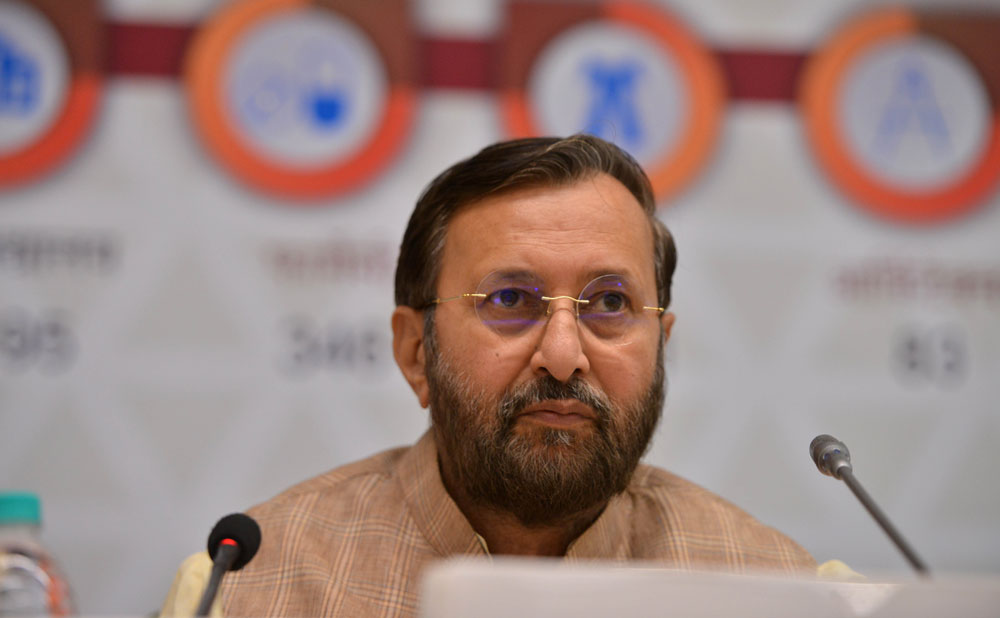The government on Saturday withdrew its order barring two Malayalam channels from telecasting for 48 hours from 7.30pm on Friday, with I&B minister Prakash Javadekar seeking to insulate the political leadership from the gag order that would have been contested legally.
While Asianet News TV was back on air around 1.30am, Media One TV resumed telecast at 9.30am.
Javadekar tried to suggest that Prime Minister Narendra Modi had intervened, saying: “Even PM expressed concern and now I will definitely go into the details and take essential steps if there is some wrongdoing.”
Such flip-flops have almost become the standard operating procedure for the Modi government in the matter of muzzling the media.
The emerging pattern of clamping down on one or two channels and then pulling back when it threatens to snowball into a controversy has stirred questions whether the government is firing a shot across the bows on the entire media landscape. The action and the retreat have fuelled suggestions that the main objective was to intimidate all media organisations into thinking twice before subjecting to scrutiny the response and role of the government in situations such as riots.
The two channels had been ordered off the air by Javadekar’s ministry on Friday for highlighting, among other things, “attack on places of worship” during the Delhi riots, “siding towards a particular community” and alleging “police inaction”.
Both channels had stood by their coverage in their responses to the notices.
Asianet News — in which BJP Rajya Sabha MP Rajeev Chandrasekhar’s company, Jupiter Capital, has a major holding — had said in its reply on March 3 it was tendering an unconditional apology if the ministry felt that any of its reports had violated provisions of Rules 6(1)(c) and 6(1)(e) of the Cable Television Network Rules, 1994. The ban was imposed in spite of the apology.
Media One had, however, decided to challenge the order in Kerala High Court and was preparing for it when the gag order was lifted. In a statement issued on Friday, it had described the ban as an “order to stop free and fair journalism” and asserted that it would fight legally.
“We immediately found out what actually happened and immediately restored the channels,” Javadekar told reporters.
“One of the channel owners talked to me. By night only, his channel, Asianet News, was on. And Media One is also on from today morning.”
He added: “Because our basic thought process is that press freedom is absolutely essential in a democratic set-up. And that is the commitment of Modi government, because we fought the Emergency in which press freedom was muzzled. We went to jail… and we secured press freedom.”
In November 2016, the government had ordered NDTV India off the air for 24 hours for its coverage of the Pathankot terror attack but quickly deferred the directive. In April 2018, the I&B ministry directed the blacklisting of accredited journalists if they spread fake news but withdrew the order.
In both instances, there was a backlash from the media fraternity, with some of the government-friendly channels too joining in the protest against the move to blacklist journalists.
In 2018, too, I&B ministry officials had said that the Prime Minister had intervened to have the order withdrawn, projecting him as the custodian of media freedom although it is no secret that very little happens in the government without his nod.
This time, too, the media was quick to fight back. In Kerala, journalists took to the streets on Friday night. A protest was held in Delhi too. Media organisations issued strongly worded statements, with the Press Club of India describing the crackdown as testimony to an “illiberal attitude… suggestive of a bias towards censorship’’.
“The Press Club of India is deeply concerned by this development. Considering the grounds on which the two orders for the two channels were passed, the intention appears to be to browbeat the press. This is very unfortunate. It is extremely unhealthy for a democracy,” the statement said.
‘“Siding’ with one community and being ‘critical towards Delhi police and RSS in the coverage of the recent communal violence in Delhi’ were cited as reasons for proceeding against the Kerala channels…. These are unprecedented grounds. Since when has it been the case that the police, as well as a social, cultural or political organisation, are out of bounds for criticism and beyond the pale of public scrutiny?’’
In a related statement, News Broadcasters Association (NBA) president Rajat Sharma condemned the ministry’s decision and appreciated “the concern shown’’ by the Prime Minister and the subsequent withdrawal of the ban.
Before the government moved in to control the damage, the Committee to Protect Journalists had demanded the immediate lifting of the ban, which the CPM billed a “direct assault on the media’’.










